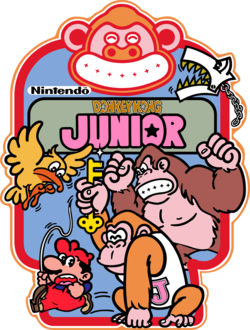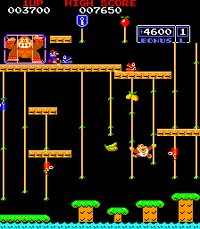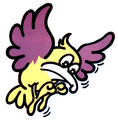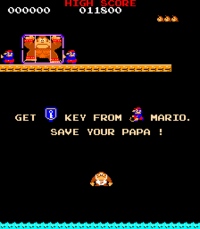Donkey Kong Jr. (game): Difference between revisions
AlexBot2004 (talk | contribs) m (→References) |
No edit summary |
||
| Line 6: | Line 6: | ||
|publisher=[[Nintendo]]<br> {{wp|Coleco}} (ColecoVision, Atari 2600, Intellivision, and Coleco Adam ports) <br> {{wp|Atari, Inc.}} (Atari 8-bit computer port)<br> {{wp|Atari Corporation}} (Atari 7800 port) <br> {{wp|Hamster Corporation|Hamster}} (Arcade Archives) | |publisher=[[Nintendo]]<br> {{wp|Coleco}} (ColecoVision, Atari 2600, Intellivision, and Coleco Adam ports) <br> {{wp|Atari, Inc.}} (Atari 8-bit computer port)<br> {{wp|Atari Corporation}} (Atari 7800 port) <br> {{wp|Hamster Corporation|Hamster}} (Arcade Archives) | ||
|designer=[[Shigeru Miyamoto]] | |designer=[[Shigeru Miyamoto]] | ||
|release='''Arcade:<br>'''{{release|Japan|August 2, 1982<ref>[https://archive.org/details/game-machine-magazine-19820815p/page/n3/mode/1up Game Machine August 15, 1982 issue, page 7 & 13]</ref>|USA|September 1982<ref>[https://archive.org/details/cashbox44unse_14/page/40/mode/1up Cash Box September 18, 1982 issue, page 40]</ref>}} '''ColecoVision:'''<br>{{release|USA|February 1983<ref>[https://retrocdn.net/images/1/1a/ComputerEntertainer_US_Vol.1_12.pdf The Video Game Update, March 1983. Pages 6 & 8]</ref>|Europe|1983}} '''Famicom/NES:'''<br>{{release|Japan|July 15, 1983|USA|June 1986|Europe|June 15, 1987<ref>[http://www.themushroomkingdom.net/games/dkjr-nes Date info of Donkey Kong Jr. (NES) from TMK], retrieved 4/1/2008</ref>}}'''Atari 2600:'''<br>{{release|USA|September 1983<ref>[https://retrocdn.net/images/f/fc/ComputerEntertainer_US_Vol.2_06.pdf The Video Game Update, September 1983. Pages 82 & 96.]</ref>|Europe|1983|Australia|1983}} '''Intellivision:'''<br>{{release|USA|October 1983<ref>[https://retrocdn.net/images/d/d1/ComputerEntertainer_US_Vol.2_07.pdf The Video Game Update, October 1983. Pages 101 & 112]</ref>|Europe|1983}} '''Atari 8-bit computers:'''<br>{{release|USA|March 1984<ref name=4/84>[https://retrocdn.net/images/3/38/ComputerEntertainer_US_Vol.3_01.pdf The Video Game Update, April 1984. Page 16.]</ref>|Europe|1985}} '''Coleco Adam:'''<br>{{release|USA|April 1984<ref name=4/84/>}} '''[[Family Computer Disk System]]:'''<br> {{release|Japan|July 19, 1988<ref>[http://www.themushroomkingdom.net/games/dkjr-fds Date info of Donkey Kong Jr. (FDS) from TMK], retrieved 4/1/2008</ref>}}'''Atari 7800:'''<br>{{release|USA|November 1988|Europe|1989<ref>[http://www.atarimania.com/catalog-atari-atari-uk-games-catalogue_357_7.html Atari UK 1989 catalog]</ref>}} '''e-Reader:'''<br> {{release|USA|September 16, 2002<ref>[http://themushroomkingdom.net/games/dkjr-e Date info of Donkey Kong Jr. (e-Reader) from TMK], retrieved 11/25/2012</ref>}}'''[[Virtual Console#Wii|Virtual Console]] ([[Wii]]):'''<br>{{release|Japan|December 2, 2006|USA|December 4, 2006|Europe|December 22, 2006}}'''[[Virtual Console#Nintendo 3DS|Virtual Console]] ([[Nintendo 3DS|3DS]]) (Ambassador Program Release):'''<br>{{release|Japan|August 31, 2011|USA|September 1, 2011|Europe|September 1, 2011|Australia|September 1, 2011}}'''Virtual Console (3DS) (Full Release):'''<br>{{release|Japan|April 18, 2012|USA|June 14, 2012|Europe|August 23, 2012|Australia|August 23, 2012|South Korea|April 6, 2016<ref>https://themushroomkingdom.net/games/dkjr-vc-3ds</ref>}}'''[[Virtual Console#Wii U|Virtual Console]] ([[Wii U]]):'''<br>{{release|USA|April 26, 2013|Europe|April 27, 2013|Australia|April 28, 2013|Japan|July 15, 2013}}'''NES Classic Edition:'''<br>{{release|Australia|November 10, 2016|USA|November 11, 2016|Europe|November 11, 2016}}'''[[Nintendo Switch]] (''[[Arcade Archives]]''):'''<br>{{release|Japan|December 21, 2018|USA|December 21, 2018|Europe|December 21, 2018|Australia|December 21, 2018}}'''[[Nintendo Entertainment System - Nintendo Switch Online]]:'''<br>{{release|Japan|May 15, 2019<ref>Nintendo. (May 7, 2019). [https://youtu.be/cczZrEUpV8Q ファミリーコンピュータ Nintendo Switch Online 追加タイトル <nowiki>[2019年5月]</nowiki>]. ''YouTube''. Retrieved May 7, 2019.</ref>|USA|May 15, 2019<ref>Nintendo. (May 7, 2019). [https://youtu.be/jdyNmSMxbAQ Nintendo Entertainment System - May Game Updates - Nintendo Switch Online]. ''YouTube''. Retrieved May 7, 2019.</ref>|Europe|May 15, 2019<ref>[https://twitter.com/NintendoEurope/status/1126154124104482816 Nintendo of Europe Twitter]</ref>|Australia|May 15, 2019<ref>[https://twitter.com/NintendoAUNZ/status/1128585854837035008 Nintendo AU NZ Twitter]</ref>|HK|May 15, 2019|South Korea|May 15, 2019}} | |release='''Arcade:<br>'''{{release|Japan|August 2, 1982<ref>[https://archive.org/details/game-machine-magazine-19820815p/page/n3/mode/1up Game Machine August 15, 1982 issue, page 7 & 13]</ref>|USA|September 1982<ref>[https://archive.org/details/cashbox44unse_14/page/40/mode/1up Cash Box September 18, 1982 issue, page 40]</ref>}} '''ColecoVision:'''<br>{{release|USA|February 1983<ref>[https://retrocdn.net/images/1/1a/ComputerEntertainer_US_Vol.1_12.pdf The Video Game Update, March 1983. Pages 6 & 8]</ref>|Europe|1983}} '''Famicom/NES:'''<br>{{release|Japan|July 15, 1983|USA|June 1986|Europe|June 15, 1987<ref>[http://www.themushroomkingdom.net/games/dkjr-nes Date info of Donkey Kong Jr. (NES) from TMK], retrieved 4/1/2008</ref>}}'''Atari 2600:'''<br>{{release|USA|September 1983<ref>[https://retrocdn.net/images/f/fc/ComputerEntertainer_US_Vol.2_06.pdf The Video Game Update, September 1983. Pages 82 & 96.]</ref>|Europe|1983|Australia|1983}} '''Intellivision:'''<br>{{release|USA|October 1983<ref>[https://retrocdn.net/images/d/d1/ComputerEntertainer_US_Vol.2_07.pdf The Video Game Update, October 1983. Pages 101 & 112]</ref>|Europe|1983}} '''Atari 8-bit computers:'''<br>{{release|USA|March 1984<ref name=4/84>[https://retrocdn.net/images/3/38/ComputerEntertainer_US_Vol.3_01.pdf The Video Game Update, April 1984. Page 16.]</ref>|Europe|1985}} '''Coleco Adam:'''<br>{{release|USA|April 1984<ref name=4/84/>}} '''[[Family Computer Disk System]]:'''<br> {{release|Japan|July 19, 1988<ref>[http://www.themushroomkingdom.net/games/dkjr-fds Date info of Donkey Kong Jr. (FDS) from TMK], retrieved 4/1/2008</ref>}}'''Atari 7800:'''<br>{{release|USA|November 1988|Europe|1989<ref>[http://www.atarimania.com/catalog-atari-atari-uk-games-catalogue_357_7.html Atari UK 1989 catalog]</ref>}} '''e-Reader:'''<br> {{release|USA|September 16, 2002<ref>[http://themushroomkingdom.net/games/dkjr-e Date info of Donkey Kong Jr. (e-Reader) from TMK], retrieved 11/25/2012</ref>|Mexico|October, 2002<ref>[https://web.archive.org/web/20021013125448/http://www.nintendo.com.mx/Juegos/gameboy_advance/donkeykonge.html Official Mexican Website]. From the Original [http://www.nintendo.com.mx/Juegos/gameboy_advance/donkeykonge.html]. Retrieved November 28, 2022.</ref>}}'''[[Virtual Console#Wii|Virtual Console]] ([[Wii]]):'''<br>{{release|Japan|December 2, 2006|USA|December 4, 2006|Europe|December 22, 2006}}'''[[Virtual Console#Nintendo 3DS|Virtual Console]] ([[Nintendo 3DS|3DS]]) (Ambassador Program Release):'''<br>{{release|Japan|August 31, 2011|USA|September 1, 2011|Europe|September 1, 2011|Australia|September 1, 2011}}'''Virtual Console (3DS) (Full Release):'''<br>{{release|Japan|April 18, 2012|USA|June 14, 2012|Europe|August 23, 2012|Australia|August 23, 2012|South Korea|April 6, 2016<ref>https://themushroomkingdom.net/games/dkjr-vc-3ds</ref>}}'''[[Virtual Console#Wii U|Virtual Console]] ([[Wii U]]):'''<br>{{release|USA|April 26, 2013|Europe|April 27, 2013|Australia|April 28, 2013|Japan|July 15, 2013}}'''NES Classic Edition:'''<br>{{release|Australia|November 10, 2016|USA|November 11, 2016|Europe|November 11, 2016}}'''[[Nintendo Switch]] (''[[Arcade Archives]]''):'''<br>{{release|Japan|December 21, 2018|USA|December 21, 2018|Europe|December 21, 2018|Australia|December 21, 2018}}'''[[Nintendo Entertainment System - Nintendo Switch Online]]:'''<br>{{release|Japan|May 15, 2019<ref>Nintendo. (May 7, 2019). [https://youtu.be/cczZrEUpV8Q ファミリーコンピュータ Nintendo Switch Online 追加タイトル <nowiki>[2019年5月]</nowiki>]. ''YouTube''. Retrieved May 7, 2019.</ref>|USA|May 15, 2019<ref>Nintendo. (May 7, 2019). [https://youtu.be/jdyNmSMxbAQ Nintendo Entertainment System - May Game Updates - Nintendo Switch Online]. ''YouTube''. Retrieved May 7, 2019.</ref>|Europe|May 15, 2019<ref>[https://twitter.com/NintendoEurope/status/1126154124104482816 Nintendo of Europe Twitter]</ref>|Australia|May 15, 2019<ref>[https://twitter.com/NintendoAUNZ/status/1128585854837035008 Nintendo AU NZ Twitter]</ref>|HK|May 15, 2019|South Korea|May 15, 2019}} | ||
|languages={{languages|en_us=y}} | |languages={{languages|en_us=y}} | ||
|genre=Retro/Platform | |genre=Retro/Platform | ||
Revision as of 12:37, November 28, 2022
- "Donkey Kong 2" redirects here. For the Game & Watch game, see Donkey Kong II. For the second installment of the Donkey Kong Country series, see Donkey Kong Country 2: Diddy's Kong Quest. For the second installment of the Donkey Konga series, see Donkey Konga 2.
| Donkey Kong Jr. | |
|---|---|
 Art of the arcade cabinet. For alternate box art, see the game's gallery. | |
| Developer | Nintendo Research & Development 1 Iwasaki Engineering[1] Nintendo Research & Development 2 (Famicom/NES port)[2] Coleco (ColecoVision, Atari 2600, Intellivision, and Coleco Adam ports) Atari, Inc. (Atari 8-bit computer port) ITDC (Atari 7800 port) Hamster (Arcade Archives) |
| Publisher | Nintendo Coleco (ColecoVision, Atari 2600, Intellivision, and Coleco Adam ports) Atari, Inc. (Atari 8-bit computer port) Atari Corporation (Atari 7800 port) Hamster (Arcade Archives) |
| Release date | Arcade: Template:Release ColecoVision: Template:Release Famicom/NES: Template:ReleaseAtari 2600: Template:Release Intellivision: Template:Release Atari 8-bit computers: Template:Release Coleco Adam: Template:Release Family Computer Disk System: Template:ReleaseAtari 7800: Template:Release e-Reader: Template:ReleaseVirtual Console (Wii): Template:ReleaseVirtual Console (3DS) (Ambassador Program Release): Template:ReleaseVirtual Console (3DS) (Full Release): Template:ReleaseVirtual Console (Wii U): Template:ReleaseNES Classic Edition: Template:ReleaseNintendo Switch (Arcade Archives): Template:ReleaseNintendo Entertainment System - Nintendo Switch Online: Template:Release[?] |
| Language(s) | English (United States) |
| Genre | Retro/Platform |
| Mode(s) | Up to 2 players, alternating turns |
| Cabinet | Upright and cocktail |
| Monitor | Raster, standard resolution |
| Input | Arcade: Joystick NES:
Wii: Wii U: Nintendo Switch: Nintendo 3DS: NES Classic Edition:
|
Donkey Kong Jr., also spelled Donkey Kong Junior in early arcade releases and home ports, is an arcade game starring Donkey Kong Jr. It is the direct sequel to Donkey Kong, and it and the similar Donkey Kong II, as well as Donkey Kong Circus, are the only games in the Mario franchise where Mario is the antagonist.
Donkey Kong Jr. never enjoyed the sales or the following that the original Donkey Kong did, but it did well enough to warrant a second sequel, Donkey Kong 3.
Story
After the events of Donkey Kong, Mario has captured Donkey Kong as revenge for kidnapping his lady friend and Donkey Kong Jr. has to save him. Donkey Kong Jr. will travel through four stages from the jungle to the big city to rescue his father, climbing vines, avoiding enemies and jumping on platforms along the way. However, every time Donkey Kong Jr. gets close to freeing his father, Mario just pushes him further away.
Finally in his hideout, Mario appears to be atop a skyscraper similar to 100m from the last game. Donkey Kong Jr. has to put six keys into their keyholes to free his dad and make the platform they are standing on disappear. Donkey Kong and Mario both fall down and Donkey Kong Jr. catches Donkey Kong but Mario just hits the ground. Donkey Kong Jr. carries his dad off-screen as Mario gets up and runs after them, only to be kicked right back out by Donkey Kong, forcing him to flee. In the NES version, this is altered to Mario falling to his apparent death.
Story from the Nintendo 3DS Virtual Console manual
Poor Donkey Kong™ has been captured by Mario™ and now finds himself locked up in a cage! It's up to Donkey Kong's son, Junior, to rescue him by snatching the keys to the cage away from Mario. Unfortunately for Junior, Mario won't give up those keys easily, and dangerous snapjaws, nitpickers, and sparks will attack him along the way. Will Junior be able to help his father...? That all depends on you!
Gameplay
As a direct sequel, Donkey Kong Jr. retains many elements from Donkey Kong, although the two games are significantly different. While the original installment took place in a construction setting, Donkey Kong Jr. takes place in a jungle-like setting, from which Donkey Kong Jr. can climb up vines, drop fruit, or jump from place to place.
In order to free his father, Donkey Kong Junior must collect the key being kept at the end of each level, eventually using those keys to free his father in the end. All the while, however, Mario will sit near the Key as well as Donkey Kong's cage, summoning waves of monsters after Donkey Kong Junior from his position. After Donkey Kong Jr. gains a key, Mario will take Donkey Kong to the next location.
Levels
In the Japanese arcade version, the stages follow each other in each other in the same order for every loop.
- Vine Scene
- Jump Board Scene (not found in the Atari 2600 port)
- Mario's Hideout (not found in the ColecoVision and Intellivision ports)
- Chain Scene
In the international arcade version, the middle stages are only revealed during the second and third loop with the fourth loop onward matching the Japanese version. The Atari 8-bit computers, ColecoVision, Coleco Adam, and Intellivision ports follow this progression. The Atari 2600 port put Mario's Hideout after the Chain Scene for every loop.
Like its predecessor, this game also has a kill screen on level 22 based on the same integer overflow glitch.
Characters
| Character | Name | Debut | Information |
|---|---|---|---|
| Donkey Kong Jr. | Vine Scene | The son of Donkey Kong, Donkey Kong Junior is the titular protagonist of Donkey Kong Jr., who has the ability to climb up vines. | |
| Donkey Kong | Vine Scene | Donkey Kong Jr.'s father, held by Mario at the end of every level. | |
| Mario | Vine Scene | The main antagonist, Mario appears in every level at the end of each stage, throwing obstacles at Donkey Kong Jr. or guarding Donkey Kong. |
Enemies
| Enemy | Name | Debut | Information |
|---|---|---|---|
| Snapjaw | Vine Scene | Crocodile-like enemies that move after Donkey Kong Junior. Red ones will stay in one particular area, while the blue ones, which are summoned by Mario, will move aimlessly until they reach a vine, where they will continuously move down until they fall off. | |
| Nitpicker | Jump Board Scene | Vulture-like birds that fly down once in an attempt to ram into Donkey Kong Junior. Some may also drop eggs at random intervals. | |
| Spark | Mario's Hideout | Electrical balls of energy that travel around a set platform. Blue ones, summoned by Mario, will constantly move downwards. | |
| Bird | Chain Scene | Raven-like Nitpickers that fly down the screen in a zigzag-like pattern in an attempt to ram into Donkey Kong Junior. |
Items
| Item | Name | Effect |
|---|---|---|
| Fruit | Fruit can be dropped onto enemies directly bellow Donkey Kong Jr., otherwise gaining a point bonus if no enemy is hit. | |
| Key | Keys are guarded by Mario at the end of each stage. It is mandatory for Donkey Kong Junior to grab these items in order to free his father. |
Re-releases
The international arcade version was re-released in North America by Namco in 2004 as part of compilation arcade cabinet Donkey Kong/Donkey Kong Jr./Mario Bros.
On December 21, 2018, both the Japanese and international arcade versions were re-released for the first time on a home console as part of Hamster Corporation's Arcade Archives brand on the Nintendo Switch's eShop.[3]
Ports
Donkey Kong Jr. was also ported to various game consoles and home computers.[4]
- Like Donkey Kong, Nintendo awarded home console licensing to Coleco while giving Atari, Inc. the rights to publish home computer ports. The latter did so only for their Atari 8-bit family computers. Atari UK finished but did not release ports for the BBC Micro and ZX Spectrum. However, these were leaked anyway. Atari Corporation later published a port for their Atari 7800 console after Coleco had pulled out of the video game market.
- Donkey Kong Jr. was released on the Family Computer as a launch title and on the Nintendo Entertainment System as part of the Arcade Classics Series, along with Donkey Kong Classics and Donkey Kong Jr. + Jr. Sansū Lesson but the latter lacks the Jump Board Scene and Mario's Hideout. The NES port has been re-released many times starting with the FDS in 1988. In 2002, the NES version was re-released under the title Donkey Kong Jr.-e for the e-Reader as part of Series One. The NES version is also available as a Virtual Console title for the Wii, Nintendo 3DS, and Wii U, with the Nintendo 3DS version also being a part of the 3DS Ambassador Program. The NES version is also a part of the group of games in the NES Classic Edition system. This version was again made available on the Nintendo Entertainment System - Nintendo Switch Online service on May 15th, 2019. This version also appears as a minigame in Animal Crossing.
- Donkey Kong Jr. was remade into a Game & Watch game under the same name, which was later a part of the Mini Classics series, and later receiving a port onto the Nintendo DSi. The Game & Watch version is also a part of the minigame collection in Game & Watch Galleries 3 and 4, with both a regular and modern version.
References in later games
- Donkey Kong and Mario vs. Donkey Kong: Donkey Kong Jr., as well as many enemies and gameplay elements, make an appearance in this game (with Donkey Kong Jr. only being in the former). Also, Mario's method of trapping Junior in Donkey Kong '94 is identical to Donkey Kong Jr.'s method of freeing his father from captivity. Many enemies and gameplay elements from Donkey Kong Jr. are reused in Mario vs Donkey Kong as well.
- Donkey Kong Country series: Diddy Kong and Dixie Kong's ability to climb two ropes at a time originates from Donkey Kong Jr. The music for this game is redone and replayed in the Golden Temple level of Donkey Kong Country Returns and Donkey Kong Country Returns 3D. A different cover of the song plays in the Secret Seclusion world in Donkey Kong Country: Tropical Freeze. The plotline for Donkey Kong Country 2: Diddy's Kong Quest was also very similar to Donkey Kong Jr., including Donkey Kong being captured by an old enemy (in his case, Kaptain K. Rool) and requiring that Diddy save him by traveling to the place Donkey Kong was being held captive.
- Super Mario Kart: Donkey Kong Jr. appears as a playable character in this game.
- Super Smash Bros. Melee: Donkey Kong Jr. appears as a trophy in the game, and his antagonism towards Mario is referenced in the flavor text for the trophy.
- Super Smash Bros. Brawl: When Diddy Kong, Fox, and Falco arrive at the barge taking the recently-trophified Donkey Kong to the Ancient Island, Donkey Kong's trophy is shown in chains on the arms and legs, referring to Donkey Kong's captive status in the game, particularly at the Chain Scene.
- NES Remix and Ultimate NES Remix: Several challenges are based off of this game.
- Super Smash Bros. Ultimate: Donkey Kong Jr. appears in this game as a spirit. Additionally, a medley of songs named "Donkey Kong / Donkey Kong Jr." is featured.
Staff
- Main article: List of Donkey Kong Jr. staff
Produced by
Original Music by
- Yukio Kaneoka
Programming by
- H. Hoshino
- Shigeru Miyamoto
- Yoshio Sakamoto (Logo graphic)
- Kenji Nishizawa
Pre-release and unused content
- Main article: List of Donkey Kong Jr. pre-release and unused content
The arcade version includes an unused lightbulb object as well as several graphical leftovers from the original Donkey Kong. In addition, the Coleco Adam port is notable for originally featuring an unlockable stage, but it was cut at Nintendo's request.
Gallery
- For this subject's image gallery, see Gallery:Donkey Kong Jr. (game).
Donkey Kong and Donkey Kong Jr.
Media
- For a complete list of media for this subject, see List of Donkey Kong Jr. media.
Arcade
Reception
| Reviews | |||
|---|---|---|---|
| Release | Reviewer, Publication | Score | Comment |
| Wii | Damien McFerran, Nintendo Life | 4/10 | "After all these years, Donkey Kong Jr.'s levels can still be a slight challenge and hold replayability, and hardcore fans will no doubt argue that it's all about setting as high a score as possible, but it's clear that this is a game more suited for those who enjoyed it at the time of its original release in the arcades. The gameplay is far too basic to recommend this wholeheartedly when there are so many better alternatives on the Virtual Console; after watching King of Kong: A Fistful of Quarters you might be inspired to give this a whirl, but it won't keep you entertained for very long." |
| NES | Lucas M. Thomas, IGN | 5/10 | "The son of Kong arrives here in a complete conversion of his arcade debut, but this game's too short of an experience to recommend (never mind that it's already been made available through Animal Crossing and as the packed-in "launch title" for the Game Boy Advance e-Reader just a few years ago.) It's nice to see Junior, but not enough to warrant a purchase on his own." |
| Wii | Alex Navarro, GameSpot | 4.9/10 | "It was a very fun game for its time, but it hasn't held up very well over the years. The only multiplayer is a two-player, trade-off mode, and as fun as some of the levels can be, with only four to play through, you're over and done with the game before you know it. Apart from DK Jr.'s cute character sprite, the graphics are rather archaic, and the audio isn't all that enjoyable, despite a decently catchy soundtrack. The short length and crusty graphics and sound are to be expected from a perfect port of a game from 1986, but for the $5 that's being charged for it, it's tough to recommend to anyone that didn't count Donkey Kong Jr. among their most favorite of NES games. If you're on a nostalgia hunt, there are far stronger options available on the Virtual Console.'" |
| Aggregators | |||
| Compiler | Platform / Score | ||
| GameRankings | 58.17% | ||
Sales
After the fiasco involving Crazy Kong, Nintendo decided not to license production of the arcade version to other companies and not to sell printed circuit boards but only whole machines. A private showing of the game was held on July 28, 1982 before its rollout the following month.[5]
According to The Ultimate History of Video Games, the arcade version of Donkey Kong Jr. sold 30,000 units in North America, half of its predecessor.[6]
Nintendo eShop description
Original Release Date: June 1986
Based on the popular arcade game, Donkey Kong Jr. is the sequel to the immensely successful Donkey Kong™. Play as Donkey Kong's son, and rescue your dad who has been kidnapped and imprisoned in a cage by Mario™. Use your jumping and climbing abilities to clamber up vines and chains, gather vital fruit and keys, and open the cage to free your father. Make sure you avoid the pesky birds, nasty electric sparks, and creepy chompers! Four different worlds filled with numerous climbing and jumping puzzles await you in this timeless classic.
Names in other languages
| Language | Name | Meaning | Notes |
|---|---|---|---|
| Japanese | ドンキーコング ジュニア (arcade) ドンキーコングJR. (Famicom) ドンキーコングJr. (newer)[?] Donkī Kongu Junia |
Donkey Kong Junior or Donkey Kong Jr. |
Trivia
- During the intro of the arcade version of Donkey Kong Jr., there were actually two Marios seen carrying Donkey Kong's cage away.
- Most versions of Donkey Kong Jr., including the NES version, had the ending theme played once instead of twice. The four versions to break this rule were the Arcade, Intellivision, Coleco Adam, and Atari 8-bit computer ports.
- In the arcade version of the game, between the second and third stages, Mario carries Donkey Kong away in a yellow helicopter, with Jr. following close behind with a parasol.
- Coleco's 1983 TV commercial for their console ports featured a live action rendition of Mario as a cartoonish Vaudeville villain.[7]
References
- ^ Gamasutra: The Secret History of Donkey Kong
- ^ Iwata, Satoru et al. Iwata Asks: New Super Mario Bros. Wii. Nintendo. Retrieved May 01 2015
- ^ https://nintendoeverything.com/arcade-archives-donkey-kong-jr-heading-to-switch-this-week/
- ^ Donkey Kong Jr. - Versions Comparison (HD)
- ^ Game Machine September 15, 1982 issue, page 30
- ^ The Ultimate History of Video Games: from Pong to Pokémon and beyond...the story behind the craze that touched our lives and changed the world. October 2, 2001. Page 352.
- ^ Donkey Kong Jr. commercial, 1983
| Donkey Kong Jr. | ||
|---|---|---|
| Characters | Donkey Kong Jr. • Donkey Kong • Mario | |
| Enemies | Bird • Drop* • Egg • Nitpicker • Snapjaw • Spark | |
| Items | Fruit • Key | |
| Objects | Chain • Jump Board • Pole • Vine | |
| Rounds | Vine Scene • Jump Board Scene • Mario's Hideout • Chain Scene | |
| Other | Gallery • Media • Pre-release and unused content • Staff | |






